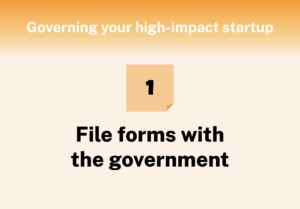
This post is part of a series designed to help you register a high-impact startup. Here, we focus on filings specific to the US, although similar processes may be common in other jurisdictions.
What needs to be filed?
You’ll need to file documents during the formation of your organization with either federal and state agencies, or both. These are the documents described in Create governing documents.
However, in addition, you may also need to file documents on a recurring basis with both the federal government and state departments.
Since state filings will vary by state, we’ll consider the filing of federal documents here.
Federal filings by business structure
Forming filings
Here are some common federal filings to be aware of when forming your entity. For state-specific filings, check with your state department.
- Form SS-4: Application for Employer Identification Number
- Required for: All business structures except sole proprietorship
- Frequency: Once, during formation
- Description: Application for EIN
- Form 2553: Election by a Small Business Corporation
- Required for: S corp
- Frequency: Once, during formation
- Description: Election by a Small Business Corporation to elect S corp status.
- Form 1023: Application for Recognition of Exemption Under Section 501(c)(3) of the Internal Revenue Code
- Required for: Nonprofit
- Frequency: Once, during formation
- Description: Used by organizations to apply for recognition of exemption from federal income tax under Section 501(c)(3) of the Internal Revenue Code. This form requires detailed information about the organization’s structure, governance, financials, and programs.
Recurring filings
Here are some common federal forms that must be filed on a recurring basis.This is typically annually, although some filings are triggered by certain activities (such as hiring an employee).
- Form 990: Return of Organization Exempt From Income Tax
- Required for: Nonprofit
- Frequency: Annual
- Description: An annual reporting return that federally tax-exempt organizations must file with the IRS. It provides information on the filing organization’s mission, programs, and finances. This form helps the IRS and the public evaluate an organization’s operations and compliance with tax regulations.
- Form 1099: Various Information Returns
- Required for: Sole proprietorship, limited partnership (LP), limited liability partnership (LLP). Generally not required for corporations, other than certain payments (e.g. healthcare, attorneys, independent contractors). For LLCs, this depends on tax classification (either as Sole Proprietorship / Partnership, or Corporation)
- Frequency: Annual
- Description: A series of forms used to report various types of income other than wages, salaries, and tips. The most common variant, Form 1099-MISC, reports payments made to independent contractors and other non-employees.
- Form 1065: US Return of Partnership Income
- Required for: Limited partnership (LP), limited liability partnership (LLP)
- Frequency: Annual
- Description: Used by partnerships to report financial information to the IRS.
- Form 1120: US Corporation Income Tax Return
- Required for: C corp, S corp, benefit corporation, cooperative
- Frequency: Annual
- Description: Used to report income, gains, losses, deductions, credits, etc.
- Form I-9: Employment Eligibility Verification
- Required for: All US employers
- Frequency: Each time an employee is hired
- Description: Used to verify the identity and employment authorization of individuals hired for employment in the United States. Employers must ensure that employees complete this form at the time of hire.
- Form W-2: Wage and Tax Statement
- Required for: All US employers
- Frequency: Annual
- Description: Used to report wages paid to employees and the taxes withheld from them. Employers must provide a W-2 to each employee and file a copy with the Social Security Administration.
Nonprofits
Nonprofits typically have more onerous filing requirements. So, we’ve outlined the key things to bear in mind below.
Federal compliance
In order to maintain its 501(c) nonprofit status, your organization must:
- Maintain a Registered Agent
- File the appropriate document from the Form 990 series
- Submit annual financial statements
- Pay employment taxes
- Pay unrelated Business Income Tax
State compliance
Depending on the state that you’re operating in, you need to file certain documents, which include:
- State tax reporting
- Licensing and permit for charitable solicitation or fundraising
Expediting
There’s no way to tell if Form 1023 expediting has been approved (besides possibly calling the IRS). But it’ll appear on the exempt entity search ~1 week before you get the letter that whole application has been approved.
Record-keeping
Record-keeping is essential. According to the IRS compliance guide for charities, these are the documents that you should keep permanently in your files:
- IRS Form 1023
- IRS Determination letter
- Articles of incorporation
- Bylaws
- Corporate resolutions or amendments
- Minutes of board meetings
- IRS Form 990 tax returns
- Annual reports
We also recommend you keep records of the following:
- Audit reports
- Year-end financial statements
- Insurance policies
- Real estate deeds, mortgages, bills of sale
- State sales tax exemption letter
- State unemployment tax records
- Payroll records
- Employment and termination agreements
- Retirement and pension plan documents.
Stay tuned for our next post: Obtain business insurance.